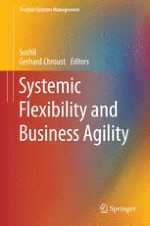2015 | OriginalPaper | Buchkapitel
6. Flexible Strategy Game-card Framework for Effective Strategy Execution
verfasst von : Amit Srivastava, Sushil
Erschienen in: Systemic Flexibility and Business Agility
Verlag: Springer India
Aktivieren Sie unsere intelligente Suche, um passende Fachinhalte oder Patente zu finden.
Wählen Sie Textabschnitte aus um mit Künstlicher Intelligenz passenden Patente zu finden. powered by
Markieren Sie Textabschnitte, um KI-gestützt weitere passende Inhalte zu finden. powered by
